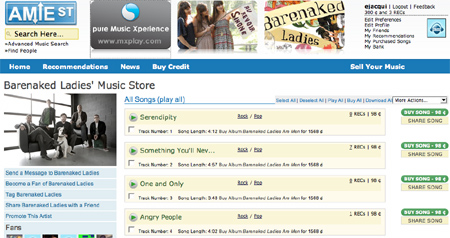As the music DRM debate rages on, some services are moving forward with DRM-free music and are starting to sign on some major names. Amie Street, launched last July, is a web-based music service that, until now, has mostly offered the music of independent artists for purchase without DRM. However, Amie Street recently signed a new deal with Nettwerk Music Group—home to a number of well-known artists such as the Barenaked Ladies, Avril Lavigne, Sarah McLachlan, and Paul Van Dyk—that has suddenly brought the service into the public eye.
Amie Street isn't just unique because of their lack of DRM. The system is set up so that all music listed on the site starts out as free, but the price of each track goes up as more people download the songs. Amie Street's max song price is 98¢ per song—similar to the prices from competing services, like iTunes—which the company says takes just under 100 downloads to reach. The Barenaked Ladies selections are already listed at 98¢ apiece (up from around 55¢ yesterday morning), which Amie Street's Joshua Boltuch told Ars was due to customers "buying them up like hotcakes." All content starts out as free, he added, including that from Nettwerk. Nettwerk's other artists are being added to the service over the coming months.

Amie Street's interface
Another thing that sets Amie Street apart from its number one competitor, iTunes, is that in order to purchase songs, customers must purchase set amounts of song credits in advance (along with a number of "RECs," which are recommendations that one can use to recommend certain songs and earn more song credits). The denominations listed on the site are for $3, $5, $10, $15, and $25, meaning that users cannot simply purchase one song at a time for just under a dollar apiece like they can through iTunes. This also means that, due to Amie Street's variable pricing, the likelihood of ever totaling up your purchases to a nice, round number are pretty slim. The customer will either end up sacrificing a few cents to the Amie Street deities or will be forced to buy another set of credits to use on more songs in the future.
Amie Street allows customers to listen to long (85 seconds) previews of each song—the interface to which appears to be Flash-based and platform-independent. Users can either purchase individual tracks or entire albums, although the price for albums is based on the pricing for individual tracks (unlike iTunes, where album prices can be much lower than the sum of the individual track prices).
During my exploration of the site, I purchased Emma Burgess' album for a grand total of $1.38—not a bad deal at all, not to mention that I get to revel in the glorious, DRM-free freedom of my legally-purchased, 192kbps MP3 files. I'm putting it on all of the seven in-use computers in my household already.
Amie Street's site seems to be suffering from some slowness and hanging issues as of the last couple of days, most likely due to the recent Nettwerk announcement. Will other studios join the party? Probably not for a while. EMI was widely rumored to have been in talks to drop DRM from its music at various online music stores, but more recent reports have said that the studio has backed out of those talks because none of the music stores would pony up for the privilege of selling DRM-free music. All eyes will be watching how well Nettwerk's artists sell through Amie Street, however, and its performance may determine whether other studios will be willing to dip their toes into the DRM-free waters in the future.
reader comments